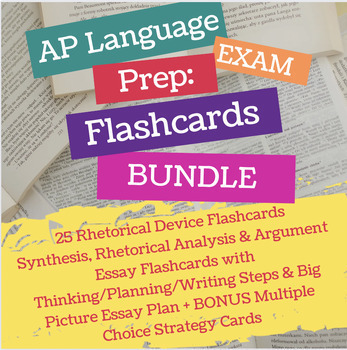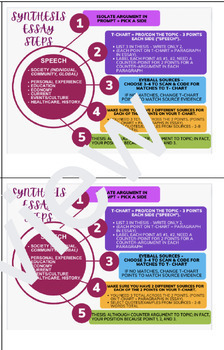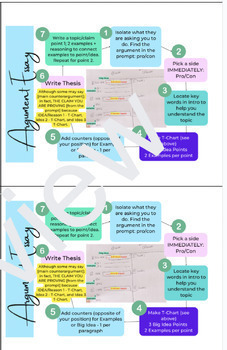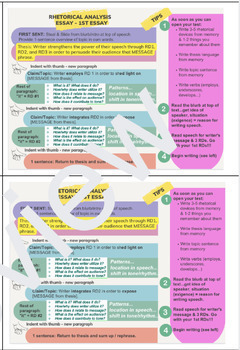AP Language Exam Prep FLASHCARD BUNDLE - Rhetorical Device + Essay Writing Cues
- Google Drive™ folder

Products in this Bundle (4)
Bonus
Description
This listing is a great writing/test prep aide: 25 rhetorical device flashcards detailing 16 rhetorical devices + essay writing flashcards for each of the 3 essays on the exam. The flashcards are colorful and chunk the process of each of the three essays.
The flashcards for the Argument and Synthesis essays are two-sided with a big picture process/planning on one side and a visual overview of the essay with thinking prompts and helpful stems. The Rhetorical essay flashcard is one-sided with a big picture overview + stems. The 3 essay flashcards are helpful for students to prepare for the three essays by jump-starting their thinking as they plan and prepare to develop the essay within the exam timelines. I print these flashcards in color and laminate them for students to add to their study ring. Students love the tactile, novel element of these cards, and putting these cards on a ring helps students stay organized.
The flashcards for rhetorical devices cover parallelism, analogy (metaphor/simile), juxtaposition, colloquialism, irony, understatement, litotes, sarcasm, asyndeton, polysyndeton, paradox, antithesis, oxymoron, rhetorical question. Each flashcard contains the purpose and effect of each rhetorical device. There are a total of 25 cards. I print these and students glue them onto note cards and add them to their study ring.
Also included: Rhetorical Device Writing Cards that chunk and visualize the thinking, planning, writing steps for the rhetorical analysis essay. Each card contains thinking questions to prompt students' development of analysis and commentary. I print in color and laminate these cards for students to use while practicing writing their rhetorical analysis essays in class. They hold on to these throughout the year up until the exam and add them to their study ring.
I've also included a bonus 5 multiple choice flashcards with strategies.
The flashcard sets offer students reminders on the process, planning, and writing development as well as a visual representation of how the essays are similar/different to one another. My students carry these study aides with them right up until the test and have taken them on with them to AP Lit.
Want more test prep materials to help students gain confidence and get ready for the exam? Check out my ultimate bundle for AP Lang Exam Prep that contains 23 resources. While these are great for preparing for the exam, I use these all year as I teach the skills of the course.





